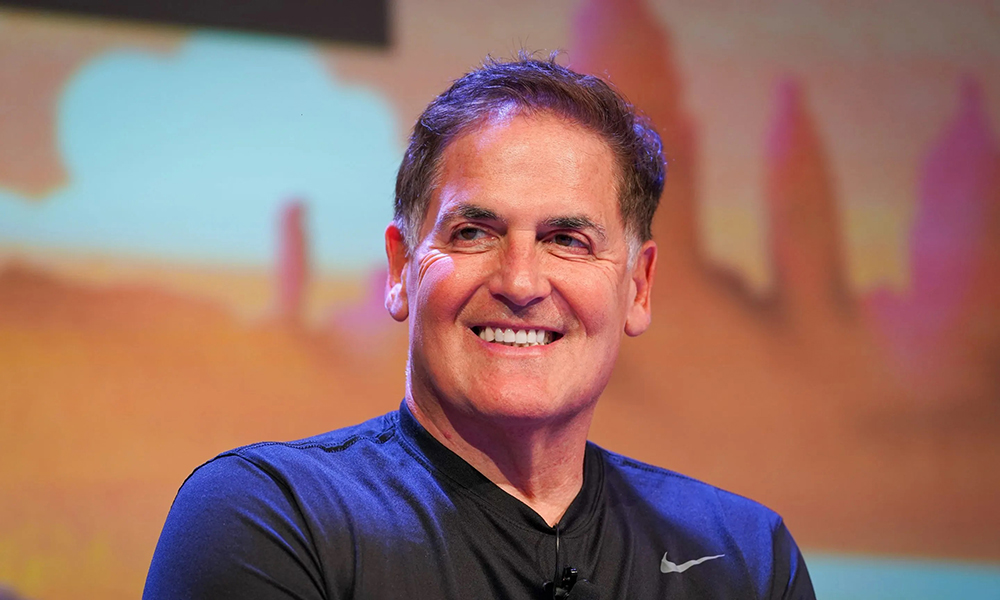
? 馬克?庫班:AI仍處于早期階段,,但它有創(chuàng)造巨額財富的潛力,,甚至有望催生全球第一位萬億資產(chǎn)級別的富豪,。他在自己的生活中也經(jīng)常使用AI,,他認(rèn)為AI可以大幅提高生產(chǎn)力和創(chuàng)造力。不過,,他也承認(rèn)AI存在一些風(fēng)險和局限性,。
世界上有好幾家最偉大最成功的科技公司都誕生在私家車庫里。比如史蒂夫·喬布斯就是在他父母家的車庫里創(chuàng)辦了蘋果,,杰夫?貝佐斯也是在自己的車庫里創(chuàng)辦了亞馬遜,。
而現(xiàn)在,隨著AI的普及,,萬眾創(chuàng)業(yè)時代也將迎來新一波的造富神話,。前達(dá)拉斯小牛隊(duì)老板、《創(chuàng)智贏家》的明星嘉賓馬克·庫班最近就表示,,AI很有可能催生出全球第一位資產(chǎn)達(dá)到萬億美元級的富翁,。
“至于AI能做的最厲害的、最瘋狂的事是什么,,我們現(xiàn)在還沒有見到呢,。”庫班在6月29日播客節(jié)目《High Performance》上表示:“我不僅相信,AI會造就一個萬億美元資產(chǎn)級別的富豪,,而且他可能只是一個在地下室里搞研究的家伙,。AI的潛力就是這么瘋狂?!?/p>
以O(shè)penAI為例,,這家公司就是它的聯(lián)合創(chuàng)始人兼總裁格雷格?布羅克曼2015年在他家的客廳里創(chuàng)辦的。今年3月,,OpenAI完成了一筆400億美元融資,,其估值目前已達(dá)到3000億美元,該公司CEO山姆·奧特曼的身家起碼也有20億美元,。
雖然這離萬億美元資產(chǎn)還相去甚遠(yuǎn),,不過財富追蹤機(jī)構(gòu)Informa Connect在 2024年9月份發(fā)布的一份報告中稱,特斯拉首席執(zhí)行官伊隆·馬斯克有望在2027年前成為萬億級富翁,。馬斯克還擁有自己的AI初創(chuàng)公司xAI,,該公司的估值約為 800億美元。
“總有創(chuàng)新型企業(yè)家能打造出更大更好的東西,,但是AI的潛力讓一切都相形見絀,。”馬克·庫班說,。
馬克·庫班是如何使用AI的
庫班非??春肁I的潛力。他表示,,就這項(xiàng)技術(shù)的真正潛力而言,,我們目前還僅僅處于“季前賽”階段,。
“我并不是說,,我們會造出《終結(jié)者》那種機(jī)器人,也不是說,,機(jī)器不會像電影里那樣突然變得比人還聰明,。但是隨著技術(shù)的不斷技步,我們會找到讓生活更美好更有趣,,讓工作更出色更高效的方法,。”
庫班還表示,,他現(xiàn)在幾乎在每件事上都會用到AI,。比如庫班自己患有心房顫動(簡稱“房顫”),他也會用AI技術(shù)來監(jiān)測健康數(shù)據(jù),。
他平時需要記錄自己服藥和鍛煉的時間,,所以他借助了ChatGPT來輔助記錄。他還讓ChatGPT幫忙留意,如果自己的記錄有不對勁的地方,,或者有需要關(guān)注的情況,,就及時提醒他。
“而且它真就到了,,不過你得注意,,這就好比你跟一個你覺得某方面知識很淵博的朋友聊天,但是你還是要注意,,該看專家的時候就得去看專家,。但是AI能夠完成這個過程,還能發(fā)現(xiàn)很多連我自己可能也不會發(fā)現(xiàn)的問題,,這種感覺太不可思議了,。”
庫班還談到了一個更值得關(guān)注的問題——在涉及健康或生命的重大決策時,,依賴AI是否是一件好事?,F(xiàn)在在健康問題上,很多人都找AI來獲得建議,,甚至是獲得心理疏導(dǎo),。但是專家們警告稱,這項(xiàng)技術(shù)仍然存在局限性,,甚至偶爾也會出錯,。
對于這一點(diǎn),庫班表示,,他會提出更多問題來質(zhì)疑 AI工具,,而且自己也會做研究。
“有時候,,我覺得它給出的答案不對,,我就會說:‘我覺得你說得不對,我需要你展示你得出這個結(jié)論的依據(jù),?!@和你跟朋友或者同事聊天時,直接指出他們的意見不對沒什么兩樣,?!?/p>
至于AI是否會搶走所有人的工作,庫班并不同意這個看法,。
“雖然AI可以做很多事,,但我不認(rèn)為AI會搶走所有人的飯碗,這種事是不會發(fā)生的,。不過在那些你喜歡做的事情上——不管你想創(chuàng)業(yè)創(chuàng)新,,還是做些別的事,,又或者你只是想排解一下無聊,它都是最好的無聊搭子,?!保ㄘ敻恢形木W(wǎng))
譯者:樸成奎
? 馬克?庫班:AI仍處于早期階段,但它有創(chuàng)造巨額財富的潛力,,甚至有望催生全球第一位萬億資產(chǎn)級別的富豪,。他在自己的生活中也經(jīng)常使用AI,他認(rèn)為AI可以大幅提高生產(chǎn)力和創(chuàng)造力,。不過,,他也承認(rèn)AI存在一些風(fēng)險和局限性。
世界上有好幾家最偉大最成功的科技公司都誕生在私家車庫里,。比如史蒂夫·喬布斯就是在他父母家的車庫里創(chuàng)辦了蘋果,,杰夫?貝佐斯也是在自己的車庫里創(chuàng)辦了亞馬遜。
而現(xiàn)在,,隨著AI的普及,,萬眾創(chuàng)業(yè)時代也將迎來新一波的造富神話。前達(dá)拉斯小牛隊(duì)老板,、《創(chuàng)智贏家》的明星嘉賓馬克·庫班最近就表示,,AI很有可能催生出全球第一位資產(chǎn)達(dá)到萬億美元級的富翁。
“至于AI能做的最厲害的,、最瘋狂的事是什么,,我們現(xiàn)在還沒有見到呢?!睅彀嘣?月29日播客節(jié)目《High Performance》上表示:“我不僅相信,,AI會造就一個萬億美元資產(chǎn)級別的富豪,而且他可能只是一個在地下室里搞研究的家伙,。AI的潛力就是這么瘋狂,。”
以O(shè)penAI為例,,這家公司就是它的聯(lián)合創(chuàng)始人兼總裁格雷格?布羅克曼2015年在他家的客廳里創(chuàng)辦的,。今年3月,,OpenAI完成了一筆400億美元融資,,其估值目前已達(dá)到3000億美元,該公司CEO山姆·奧特曼的身家起碼也有20億美元,。
雖然這離萬億美元資產(chǎn)還相去甚遠(yuǎn),,不過財富追蹤機(jī)構(gòu)Informa Connect在 2024年9月份發(fā)布的一份報告中稱,特斯拉首席執(zhí)行官伊隆·馬斯克有望在2027年前成為萬億級富翁,。馬斯克還擁有自己的AI初創(chuàng)公司xAI,,該公司的估值約為 800億美元,。
“總有創(chuàng)新型企業(yè)家能打造出更大更好的東西,但是AI的潛力讓一切都相形見絀,?!瘪R克·庫班說。
馬克·庫班是如何使用AI的
庫班非??春肁I的潛力,。他表示,就這項(xiàng)技術(shù)的真正潛力而言,,我們目前還僅僅處于“季前賽”階段,。
“我并不是說,我們會造出《終結(jié)者》那種機(jī)器人,,也不是說,,機(jī)器不會像電影里那樣突然變得比人還聰明。但是隨著技術(shù)的不斷技步,,我們會找到讓生活更美好更有趣,,讓工作更出色更高效的方法?!?/p>
庫班還表示,,他現(xiàn)在幾乎在每件事上都會用到AI。比如庫班自己患有心房顫動(簡稱“房顫”),,他也會用AI技術(shù)來監(jiān)測健康數(shù)據(jù),。
他平時需要記錄自己服藥和鍛煉的時間,所以他借助了ChatGPT來輔助記錄,。他還讓ChatGPT幫忙留意,,如果自己的記錄有不對勁的地方,或者有需要關(guān)注的情況,,就及時提醒他,。
“而且它真就到了,不過你得注意,,這就好比你跟一個你覺得某方面知識很淵博的朋友聊天,,但是你還是要注意,該看專家的時候就得去看專家,。但是AI能夠完成這個過程,,還能發(fā)現(xiàn)很多連我自己可能也不會發(fā)現(xiàn)的問題,這種感覺太不可思議了,?!?/p>
庫班還談到了一個更值得關(guān)注的問題——在涉及健康或生命的重大決策時,依賴AI是否是一件好事?,F(xiàn)在在健康問題上,,很多人都找AI來獲得建議,,甚至是獲得心理疏導(dǎo)。但是專家們警告稱,,這項(xiàng)技術(shù)仍然存在局限性,,甚至偶爾也會出錯。
對于這一點(diǎn),,庫班表示,,他會提出更多問題來質(zhì)疑 AI工具,而且自己也會做研究,。
“有時候,,我覺得它給出的答案不對,我就會說:‘我覺得你說得不對,,我需要你展示你得出這個結(jié)論的依據(jù),。’這和你跟朋友或者同事聊天時,,直接指出他們的意見不對沒什么兩樣,。”
至于AI是否會搶走所有人的工作,,庫班并不同意這個看法,。
“雖然AI可以做很多事,但我不認(rèn)為AI會搶走所有人的飯碗,,這種事是不會發(fā)生的,。不過在那些你喜歡做的事情上——不管你想創(chuàng)業(yè)創(chuàng)新,還是做些別的事,,又或者你只是想排解一下無聊,,它都是最好的無聊搭子?!保ㄘ敻恢形木W(wǎng))
譯者:樸成奎
? Mark Cuban said artificial intelligence is only in its early stages and has the potential to create massive wealth—possibly even the world’s first trillionaire. He uses AI extensively in his own life and sees it as a powerful tool for improving productivity and creativity. Still, he acknowledged the risks and limitations of AI.
Some of the world’s largest and most successful tech companies were built at home: Steve Jobs founded Apple in the garage of his parents’ home, and Jeff Bezos also founded Amazon in his garage.
And thanks to artificial intelligence, the trend of developing blockbuster companies at home is sure to continue. Mark Cuban, the billionaire former principal owner of the Dallas Mavericks and Shark Tank star, recently said AI could help make the world’s first trillionaire.
“We haven’t seen the best or the craziest of what [AI is] going to be able to do,” Cuban told the High Performance podcast in an episode published June 29. “And not only do I think it’ll create a trillionaire, but it could be just one dude in the basement. That’s how crazy it could be.”
Take OpenAI, for example, which was formed in cofounder and president Greg Brockman’s living room in 2015. OpenAI is currently valued at $300 billion thanks to a $40 billion fund-raising deal in March. Sam Altman, the CEO of OpenAI, is worth at least $2 billion.
While that’s a far cry from AI creating the world’s first trillionaire, a September 2024 report by wealth-tracking service Informa Connect said Tesla CEO Elon Musk is on pace to become a trillionaire by 2027. Musk also has his own AI startup xAI, which has an estimated $80 billion valuation.
“There’s always something bigger and better that’s created by an innovative entrepreneur,” Cuban said. “But AI just dwarfs all that.”
How Mark Cuban uses AI
Cuban appears to firmly believe in the power of AI, and said we’re only in the “preseason” of what the technology can really do.
“As it becomes more advanced—and I’m not saying we’re going to get the Terminator— I’m not saying all of a sudden there’s going to be robots that are smarter than people, like the movie,” he told High Performance. “But we’ll find ways to make our lives better, more interesting, to work better, more effectively.”
Cuban also said he uses AI for nearly everything. He gave an example of how he uses it to track health metrics since he suffers from atrial fibrillation (“A-fib”).
He had to track when he was taking medications and working out, and used ChatGPT to help him record it. He also asked ChatGPT to let him know if there’s something he writes down that doesn’t seem right or that he should be concerned about.
“And damn if it doesn’t do it,” Cuban said. “Now you’ve got to be careful. It’s like talking to a friend who you think knows a lot about something. You’ve still got to be careful and talk to an expert, but being able to do the process and just having things identified that I might not have known to look for was insane—just insane.”
Cuban touches on one of the larger concerns when it comes to relying on AI for making important health- or life-related decisions. While ChatGPT has served as an accessible means for getting advice, and even therapy, experts have warned the technology still has limitations and makes mistakes.
To combat this, Cuban said, he challenges the AI tools he’s using with more questions and does his own research.
“There’s times when I don’t think the answer is what it should be, or I think it’s wrong. And I’ll say, ‘I don’t think you’re right. I need you to show me the evidence of how you got to this decision,’” he explained. “And it’s no different than talking to a friend or a work colleague and just calling bulls***.”
And on the hot topic of whether AI will take everyone’s jobs, Cuban said no.
“I can just go on all the s*** I’m trying with AI, and I’m not here to tell you that it’s going to replace everybody’s job. It won’t,” he predicted. “But the things that you like to do, if you’re creative, innovative, whatever it may be—or you’re just bored—it might end up being the best alternative to boredom.”






